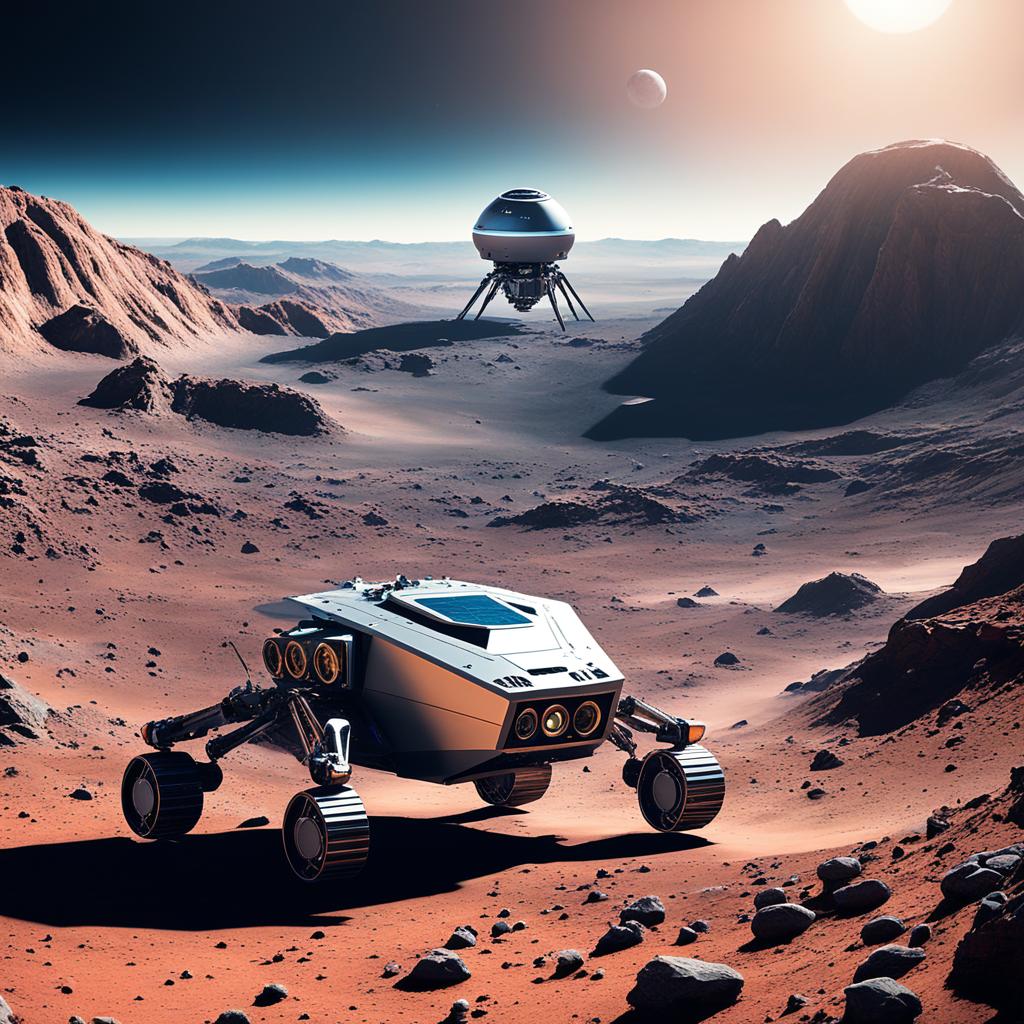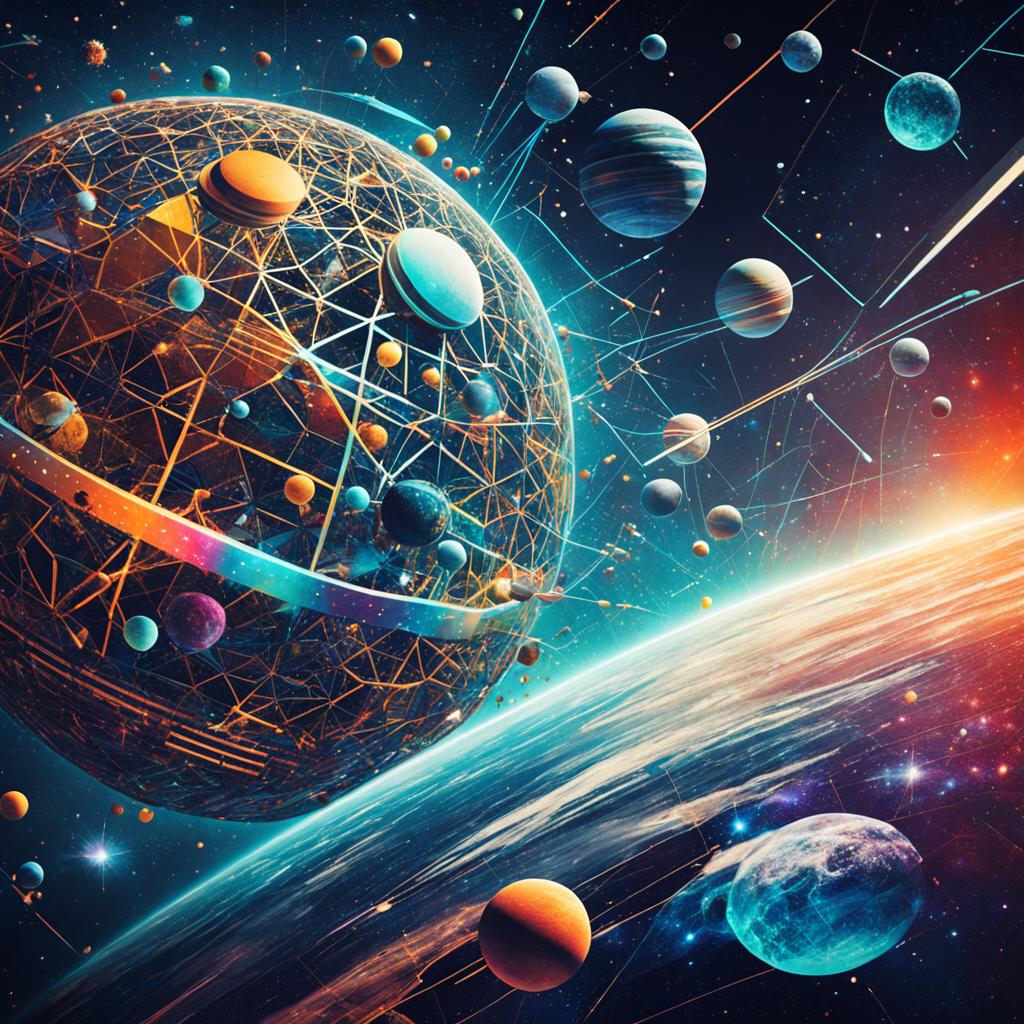Advertisements
A artificial intelligence (AI) is playing a crucial role in shaping the future of space exploration. We, astronauts, scientists and space agencies, are increasingly turning to AI to address the complex and dangerous challenges associated with space travel, exploration and observation. A AI has a wide range of applications in this field, from automating spacecraft operations to processing and analyzing large amounts of data collected in space. Additionally, AI is being used in planetary exploration, helping with the autonomous navigation of rover explorers and the analysis of images and data collected on other planets. AI plays an essential role in mapping the cosmos, helping to identify patterns and features in star clusters and contributing to the discovery of new planets. With the increasing use of AI, the future of space exploration is becoming more efficient, safer and more promising.
Main points covered in this article:
- AI is shaping the future of space exploration, bringing more efficiency and safety.
- AI is used to automate spacecraft operations and process large amounts of space data.
- Our understanding of space is enhanced through the use of AI in planetary exploration.
- AI plays an essential role in mapping the cosmos, identifying patterns and contributing to the discovery of new planets.
- AI has a significant impact on society and the future of civilization, covering diverse sectors and bringing benefits and challenges.
AI Applications in Space Exploration
AI has several applications in space exploration. One of these is the automation of spacecraft operations such as takeoff and landing, where AI can optimize fuel usage and automate functions such as landing gear deployment.
Advertisements
AI is also used in the autonomous navigation of spacecraft, such as SpaceX's Falcon 9 spacecraft, which uses an AI autopilot system to calculate space trajectories considering various factors, such as fuel use and atmospheric interference.
Additionally, AI is used in the development of robot assistants for astronauts in space, such as the CIMON 2 robot designed by Airbus, which uses IBM's Watson AI system to provide information and assistance to astronauts.
Advertisements
AI is also applied to space mission planning, helping to model and evaluate mission parameters and inform the design and engineering of future spacecraft.
Finally, AI is used to detect and evade dangers in space, such as collisions with other orbital objects, and is employed by companies such as SpaceX and the United Kingdom Space Agency.
AI has played a fundamental role in space exploration, making operations more efficient, safer and smarter. With its versatile applications, AI is helping to power the future of space exploration, opening up new possibilities and paving the way for fascinating scientific discoveries.
AI Applications in Space Exploration
| applications | Examples |
|---|---|
| Automation of spacecraft operations | Optimization of fuel use and automation of functions |
| Autonomous spacecraft navigation | Autopilot systems for calculating spatial trajectories |
| Development of robot assistants for astronauts | Using AI systems to provide information and assistance |
| Space mission planning | Modeling and evaluation of mission parameters |
| Detection and avoidance of hazards in space | AI technologies to avoid collisions with orbital objects |
As we can see, AI plays a crucial role in space exploration, facilitating complex tasks and contributing to the advancement of space science. With the constant advancement of AI technology, we can expect new applications to emerge and help us unravel the mysteries of the universe.
AI in Planetary Exploration
In planetary exploration, AI plays a fundamental role. Ours Mars Rovers, incredible exploring robots, are equipped with AI algorithms that allow them to autonomously navigate the surface of Mars, ensuring their safety and avoiding unexpected obstacles. These algorithms are specially designed to analyze and interpret images captured by Mars Rovers, helping to classify different terrain features and identify landing sites with scientific potential. The Rover Perseverance, for example, has a sophisticated computer vision system called AEGIS, which is capable of detecting and classifying different types of rocks found on Mars.
See too:
The incredible AI behind our Mars Rovers it is not just a tool restricted to specialists. With the AI4Mars initiative, we allow the public to participate in training these algorithms. It's an exciting opportunity for everyone to contribute to the exploration of Mars, helping to improve device performance and advance scientific research and discovery on the Red Planet.
AI on the Moon
AI is also being applied to our lunar exploration efforts. We are using this technology to identify the best landing sites on the Moon, allowing for efficient and strategic exploration. Furthermore, AI enables us to explore previously inaccessible areas, such as the mountainous Aristarchus Plateau, opening up new research possibilities. It's really exciting to think about what's yet to come in lunar exploration, thanks to the power of AI.
| Mars Rovers | Launch | Research on Mars |
|---|---|---|
| Curiosity | November 26, 2011 | Geological investigation, search for signs of past life |
| Perseverance | July 30, 2020 | Search for signs of habitability and collect samples for a future mission to return to Earth |
Our goal is to continue improving our Mars Rovers and expand the use of AI in our space missions. Through this combination of cutting-edge technology and scientific exploration, we are unlocking the secrets of the universe in a way never before possible. With the help of AI, we are closer than ever to understanding the vastness of the cosmos and our position within it.

We have a lot to explore and discover. AI is an essential ally in our quest for knowledge and understanding of our solar system and beyond. Whether it's Mars, the Moon or other distant planets, we're using AI to drive scientific research and shape the future of space exploration.
AI in Mapping the Cosmos
AI plays an essential role in mapping the cosmos. Astronomers use AI algorithms to recognize patterns in star clusters, helping to identify distant nebulae and classify other features detected in deep space.
One example is the Kepler telescope from NASA, which uses AI to identify the likely location of planets by analyzing drops in the light emitted by stars when a planet passes between the star and Earth.
“AI is like having an army of virtual astronomers working with us, helping to analyze large data sets and identify hidden patterns that sometimes go unnoticed by our eyes”, says Dr. James Watson, renowned astrophysicist.
Furthermore, AI is used to predict the behavior of stars and galaxies, contributing to the understanding of cosmic events such as supernovae and the detection of black holes through analysis of gravitational waves.
AI is also applied in astronomical data analysis, assisting in the classification and modeling of the known universe, in addition to contributing to the research of characteristics beyond the observable universe due to the speed of light.
Planet Detection with the Kepler Telescope
O Kepler telescope, for example, is one of the highlights of the application of AI in astronomy. It uses data collected from thousands of stars to find subtle variations in their luminosity, indicative of the presence of planets orbiting them.
With advanced AI algorithms, Kepler is able to identify small dips in the light emitted by a star when a planet passes between it and Earth. These dips are analyzed to determine the planet's likely location, its characteristics and its orbit.
Through this method, Kepler has already discovered thousands of exoplanets, helping in the search for other worlds and expanding our knowledge about the diversity of the universe.
The Importance of AI for Civilization
A artificial intelligence (AI) plays a fundamental role in modern society and the future of civilization. Its importance goes beyond industry and economy, extending to all aspects of everyday life. AI drives the economy, science and decision-making, empowering medicine to personalize treatments, industry to optimize processes and autonomous vehicles to increase road safety.
But importance of AI goes beyond that. AI has immense potential to address global challenges such as climate change and space research. Automating routine tasks, analyzing large data sets and generating innovative hypotheses are some of the advantages of AI that can drive significant advances in these areas.
However, it is important to also consider the disadvantages of AI, such as algorithmic bias and privacy concerns. It is crucial to ensure ethical and responsible implementation of AI, with appropriate regulations that protect individual and collective rights.
By balancing the advantages and disadvantages of AI, we can make the most of its potential and ensure a sustainable and collaborative future.
AI to boost Medicine, Industry and Infrastructure
In Medicine: AI is already transforming healthcare, empowering doctors and healthcare professionals to provide more efficient, personalized care. AI algorithms can analyze large sets of medical data and patient histories to aid in early diagnosis, predict potential complications, and suggest personalized treatments.
In Industry: AI is revolutionizing the industry, optimizing production processes, reducing costs and increasing efficiency. AI algorithms can identify patterns in large volumes of production data and provide valuable insights to improve product quality, efficiency and safety.
In Infrastructure: AI also plays an important role in infrastructure, driving smart solutions for cities and helping to optimize energy consumption, improve waste management and ensure environmental sustainability.
AI has the potential to revolutionize every aspect of society and shape a promising future for civilization. It is necessary to guarantee ethical use that benefits everyone.
Innovation and Challenges of AI in Society
Innovation: AI paves the way for innovation across industries. Automating routine tasks allows professionals to focus on more creative and strategic activities. Analyzing large amounts of data drives the discovery of valuable insights and making more informed decisions.
Challenges: However, AI also presents significant challenges. Algorithmic bias, for example, can result in discriminatory and unfair decisions. It is important to develop algorithms that are impartial and ethical. Issues of privacy and data security also need to be addressed to ensure the protection of individuals and confidence in the use of technology.
“We must adopt AI responsibly, considering its impact on society and ensuring it is at the service of the common good.”
The Future of AI and Responsibility in its Use
O future of AI It is promising and intrinsically linked to the future of civilization. However, it is essential that we move forward responsibly, considering the social, ethical and economic impacts of its implementation.
By developing and using AI ethically and responsibly, we can maximize its benefits and minimize risks. Investing in clear regulations, promoting transparency and equitable access to AI technologies, ensuring data protection and privacy are essential steps towards a sustainable and collaborative future.
AI has the potential to transform society in unimaginable ways. It is up to us to ensure that this transformation is carried out carefully, taking into account the values and needs of society as a whole.

Advantages and Disadvantages of AI
A artificial intelligence (AI) brings with it a series of advantages and disadvantages that must be considered when exploring this technology in various sectors. On the one hand, AI offers automation of repetitive tasks, improvements in decision-making and assistance in healthcare, bringing significant benefits to society. However, there are also drawbacks and ethical challenges that require careful attention.
Advantages of AI
AI has several advantages that can drive efficiency and progress in different fields. Some of the key benefits include:
- Automation of repetitive tasks: AI can perform monotonous and repetitive tasks faster and more accurately, freeing humans to focus on more complex and creative activities.
- Improved decision-making: AI algorithms can analyze large volumes of data and identify patterns, helping to make more informed and accurate decisions.
- Assistance in healthcare: AI can help doctors and healthcare professionals in the early identification of diseases, more accurate diagnoses and even the development of personalized treatments.
Disadvantages of AI
However, there are drawbacks and ethical challenges associated with AI that require caution. Some of the main points to consider are:
- Algorithmic bias: AI algorithms can reflect biases present in training data, resulting in biased and discriminatory results.
- Data privacy and security: The massive collection and storage of data required to power AI systems can raise privacy and security concerns, especially if adequate protection measures are not implemented.
- Technological unemployment: AI-driven automation could lead to the displacement of traditional jobs, requiring measures to reskill and adapt the workforce.
- Accountability in AI decisions: As AI makes autonomous decisions, it is critical to ensure that there is accountability for outcomes and that systems are transparent and understandable.
To address these challenges, it is essential to develop strong ethical guidelines, establish clear regulations, invest in education and training, and promote transparency in the use of AI. It is essential to strike a balance between taking advantage of the advantages offered by AI and mitigating its disadvantages, ensuring responsible and ethical use of this innovative technology.
| Advantages of AI | Disadvantages of AI |
|---|---|
| Automation of repetitive tasks | Algorithmic bias |
| Improved decision making | Privacy and data security |
| Healthcare assistance | Technological unemployment |
To have a clearer and more comprehensive view of the advantages and disadvantages of AI, you can consult the table above, which summarizes these aspects schematically.
Conclusion
The use of artificial intelligence (AI) in space exploration is revolutionizing this field, bringing efficiency, safety and opening up new possibilities. From automating spacecraft operations to analyzing data collected in space, AI plays a vital role, assisting in various tasks and decision-making. Another important aspect is the role of AI in planetary exploration, where she contributes to the autonomous navigation of exploring robots and the detailed mapping of planets such as Mars and the Moon.
In the search for knowledge of the cosmos, AI has been fundamental in identifying patterns and characteristics in star clusters, as well as in detecting new planets. These applications of AI drive economics, science, and decision-making in various areas. However, it is important to address the drawbacks and ethical challenges of AI.
For a sustainable and collaborative future of artificial intelligence, responsibility in the use of AI it's essential. This requires implementing appropriate regulations, investing in education and training programs, and ensuring ethical and responsible use of this technology. With a balanced approach, the future of artificial intelligence promises to bring significant benefits to society, shaping our future in a more promising way. We must therefore harness the potential of AI to drive our progress, always respecting ethical issues and considering the responsibility of its use.
FAQ
What are the applications of AI in space exploration?
AI is used in the automation of spacecraft operations, in the processing and analysis of data collected in space, in the autonomous navigation of exploring robots, in the mapping of planets and star clusters, among other applications.
How is AI used in planetary exploration?
AI plays a key role in planetary exploration, assisting in the autonomous navigation of exploring robots, analyzing and classifying captured images, identifying potential landing sites, and mapping planets such as Mars and the Moon.
What are the contributions of AI in mapping the cosmos?
AI is used by astronomers to identify patterns in star clusters, help identify nebulae and other features of deep space, predict the behavior of stars and galaxies, and analyze astronomical data to model and classify the known universe.
How important is AI to civilization?
AI plays a crucial role in today's society and the future of civilization, driving the economy, science, medicine and decision-making. Furthermore, AI has the potential to tackle global challenges such as climate change and space research.
What are the advantages and disadvantages of AI?
AI offers advantages such as automating repetitive tasks, improving decision-making and providing assistance in healthcare. However, it also presents ethical challenges such as algorithmic bias, data privacy and technological unemployment.
What is the conclusion about the future of AI and its responsible use?
O future of AI It promises to bring significant benefits to society, but it is essential to address its drawbacks and ethical challenges. It is necessary to establish clear regulations, invest in education and ensure the ethical and responsible implementation of AI to ensure that this technology is used in a balanced and sustainable way.
Source Links
- https://forbes.com.br/forbes-tech/2023/04/como-a-inteligencia-artificial-esta-desvendando-os-misterios-do-universo/
- https://pt.linkedin.com/pulse/acelerando-ciência-inteligência-artificial-como-da-inovação-david-r4exc
- https://pt.linkedin.com/pulse/os-próximos-passos-desenvolvimento-da-inteligência-azevedo-vargas-g5dqf?trk=article-ssr-frontend-pulse_more-articles_related-content-card
